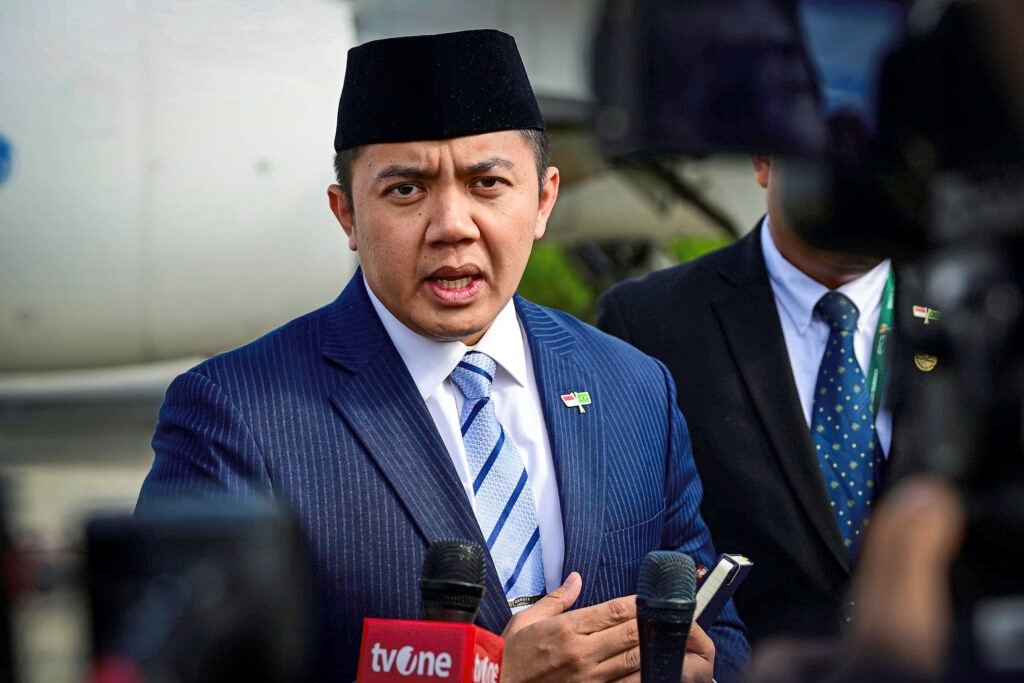Gov’t Committed to Tackling Extreme Poverty in Five Regencies in E. Java: VP

Vice President Ma’ruf Amin chairs Coordination Meeting on the Acceleration of Poverty Reduction from the Aspect of Economic Empowerment in East Java, at the Grahadi State Building, Surabaya, Thursday (30/09). (Photo by: BPMI of Vice President Secretariat/UN)
The Government has renewed its commitment to tackling extreme poverty through two major policies, including social assistance and subsidies, as well as empowerment to boost the poor’s economic capacity.
According to Vice President Ma’ruf Amin, the identification result of programs and activities in the two policies at ministries / institutions and in East Java province for the 2021 Fiscal Year shows that the budget is sufficient for poverty reduction.
The Vice President also stated that the Central Government and regional governments need to sharpen the programs so that the assistance can be right on target and priority locus can be determined.
“The budget is actually not the main issue in poverty alleviation. Our biggest challenge is how to ensure that all programs from the Central Government, provincial governments, and regency governments can be well-received by extreme poor households,” the Vice President said in Coordination Meeting on the Acceleration of Poverty Reduction from the Aspect of Economic Empowerment in East Java, at the Grahadi State Building, Surabaya, Thursday (30/09).
Furthermore, the Vice President pointed out that the total number of extreme poor people in the five priority regencies in East Java reached 508,571 people with the total number of extreme poor households reaching 265,180 households.
The number consists of Probolinggo regency with an extreme poverty rate of 9.74 percent and a total population of 114,250 extreme poor people; Bojonegoro regency recorded an extreme poverty rate of 6.05 percent and an extreme poor population of 50,200 people; Lamongan regency recorded an extreme poverty rate of 7.37 percent and an extreme poor population of 87,620 people; Bangkalan regency recorded an extreme poverty rate of 12.44 percent and a total population of 123,490 extreme poor people; and Sumenep regency recorded an extreme poverty rate of 11.98 percent and a total population of 130,750 extreme poor people.
To that end, it is necessary to determine the priority locus so that all resources can be focused on accelerating the reduction of extreme poverty.
“To overcome the problem of extreme poverty as directed by the President, we need to determine the priority locus so that we can focus on resources and accelerate extreme poverty reduction,” he said.
In this regard, the Vice President urged that a combination of indicators of the percentage of the extreme poor and the number of extreme poor people in one region should be used in identifying priority regencies / cities.
“The combination of these two indicators is expected to lead us to choose areas, not only with a high percentage of extreme poor people but also with large extreme populations,” he said.
On that occasion, Ma’ruf also revealed that it is a formidable challenge to reduce extreme poverty to zero percent by the end of 2024 as targeted by the Government. Not to mention that the reduction of extreme poverty is the final result of a broad national development process.
“The development performance carried out by the Central Government or regional governments has been the main key to reducing extreme poverty levels. In addition, since the beginning of 2020, we have also faced the COVID-19 pandemic which caused an economic contraction and increased our poverty level,” he added.
Ma’ruf also expressed optimism that the poverty issues in East Java province can be tackled through cross-stakeholder collaboration, ministries / institutions, regional governments (provincial and regency/city), village governments, as well as other non-government parties, such as business players, universities institutions, non-governmental organizations (NGOs), the media, and the community.
“This collaborative work must lead to synergy between extreme poverty reduction programs sourced from the State Budget at ministries / institutions to fund the implementation of extreme poverty reduction programs in the regions, including those sourced from regional budgets at provincial and regency/city governments,” Ma’ruf said.
The Vice President further said that the synergy must be manifested in the convergence of the program in reaching priority locus and targeting extreme poor households in priority areas.
Ma’ruf also orders the Governor and the five Regents in priority areas to ensure that all extreme poor households in their respective regions receive all programs, including programs to reduce the burden of community expenditure and community empowerment programs, as well as to strengthen the planning and budgeting of extreme poverty reduction programs in their respective regions.
Concluding his remarks, the Vice President appealed to business sector operating in priority areas to participate in reducing extreme poverty by encouraging the convergence of Corporate Social Responsibility (CSR) programs using the same approach and targets as the Government’s programs. (DND/UN) (RIF/MUR)








